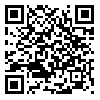BibTeX | RIS | EndNote | Medlars | ProCite | Reference Manager | RefWorks
Send citation to:
URL: http://frooyesh.ir/article-1-6048-en.html
2- Professor of Educational Psychology, Faculty of Literature and Human Sciences, Lorestan University, Khorramabad, Iran. ,
3- PhD Student in Educational Psychology, Faculty of Literature and Human Sciences, Lorestan University, Khorramabad, Iran.
The present study aimed to investigate the psychometric properties of the Persian version of the cognitive distortions questionnaire in university students. The present study was descriptive-correlational and was considered a psychometric study. All the students of the Islamic Azad University of Karaj branch who were studying in this university in the academic semester of 2023-2024 constituted the statistical population of this study. Using the available sampling method, 395 people were selected and responded to the online form of the cognitive distortions questionnaire (CD-Quest, De Oliveira et al., 2015), the depression subscale of the symptom checklist-90-R (SCL-90, Derogatis et al., 1973), and the life satisfaction scale (SWLS, Diener et al., 1985). The validity of the questionnaire was checked using confirmatory factor analysis and concurrent validity. The reliability of the questionnaire was calculated using Cronbach's alpha coefficient, McDonald's omega, and the split-half method. The results of confirmatory factor analysis confirmed the single-factor construct validity of this questionnaire. The concurrent validity of the questionnaire, which indicated a positive correlation between cognitive distortions and depression (r= 0.628, P<0.01) and a negative correlation between cognitive distortions and life satisfaction (r=-0.343, P<0.01), seemed favorable. Cronbach's alpha coefficient of the cognitive distortions questionnaire was estimated as 0.881, McDonald's omega coefficient was 0/884, and Guttman's split-half coefficient was 0.857. Generally, the results confirmed the validity and reliability of the cognitive distortions questionnaire in the Iranian student population. This questionnaire can be a useful tool for therapists and researchers who work on cognitive distortions through cognitive therapy, and especially cognitive reconstruction.
Received: 2025/02/18 | Accepted: 2025/04/18 | ePublished: 2025/08/1
| Rights and permissions | |
 |
This work is licensed under a Creative Commons Attribution-NonCommercial 4.0 International License. |





